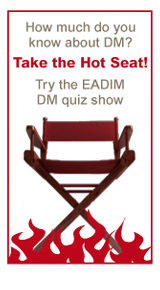|

THE FIRST RECOGNISED
PAN-EUROPEAN MARKETING
QUALIFICATION
Click here to read more…
 THE BEST MARKETING
EDUCATION
WITH INTERNATIONALLY
FAMOUS TEACHERS THE BEST MARKETING
EDUCATION
WITH INTERNATIONALLY
FAMOUS TEACHERS
Click here to read more…
|
2. Salesmanship in print.
Like the first helpful idea, this is a blinding glimpse of the obvious - yet completely ignored by most marketers. But unlike the first, it comes with a special offer you might find even more helpful.
More on that in a moment, because first I'd like you to join me you on a journey back in time.
If you study advertising - and I imagine you do, or how can you improve? - you will notice that most is very bad. A good example from people who should know better ran a while ago on the London Underground. It was a poster from the Advertising Standards Authority which read:
"We're here to make advertising better. Not to make better advertising. (Sorry.)"
This is what I call "creative masturbation" - produced entirely to please the writer, with no discernible purpose whatever. It does absolutely nothing to satisfy the question in every reader's mind: "What's in it for me?"
But what do they mean by "better" advertising? More original? More "creative" - which for many means the same thing? Or with more "impact" - whatever that means?
Did you say, "yes" to one or more of the above? If you trust the real giants of the industry, they are all wrong.
To explain why, let me take you to a modest office above a bar in Chicago 103 years ago. There the first good definition of advertising emerged. Even now many marketers - even very big ones - don't know it; but those who do have a priceless advantage.
Until then many vague phrases were used to describe advertising and how to do it. Most famous was the motto of A.J. Ayer, then the leading US agency. They said to get good advertising you must "Keep everlastingly at it". True; but not very helpful.
The office above the bar belonged to Lord & Thomas, a small firm destined to enjoy enormous success as a result of that evening. The intellectual curiosity of a young man who had just started running the firm had led him to seek a clear definition of his profession.
He was Albert Lasker, and he went on to make more money from advertising than anyone else, before or since. He realised that the way you define what you do determines what you do.
What built some of the world's biggest brands
On that night I mentioned a man in the bar below. He sent him up his card with a note saying: "I know you want to know what advertising is. I have the answer. Send back the card, and I will come and tell you".
So Lasker sent the card back, and a few minutes later a tall, striking moustachioed ex-Canadian Mountie called John E. Kennedy entered. He said to Lasker: "Advertising is salesmanship in print". Remembering that media now encompass not just print, but radio, the cinema, TV and the internet, that definition still stands.
Lasker hired Kennedy, and Lord & Thomas set out to spread the gospel of salesmanship in print. Before the end of World War 1 they were the world's largest advertising agency, which they remained until Lasker - who worked so hard he had regular nervous breakdowns - was away from the office for a while, and J. Walter Thompson overtook them.
Bad advertising is advertising which doesn't sell (and an amazing amount doesn't) or is aimed at satisfying the egos of those who create or run it - the clients - more than making sales.
In fact most creative people are more interested in awards than sales. That's not my opinion - just plain fact from research. They are keener on building their names than your sales.
So if you ever wonder why your stuff doesn't work, that's a good place to start: you're not reading from the same hymn sheet.
If it doesn't sell it isn't creative
Another early advertising titan, Claude Hopkins, succeeded Kennedy at Lord & Thomas. He put it this way: "Instead of sales, they seek applause".
Hopkins may have been the most able copywriter ever. He launched such famous brands as Quaker Puffed Wheat, Pepsodent and Chevrolet and his copy took a previously little known brand of beer, Schlitz, and quickly made it America's biggest seller.
He was so talented that Lasker hired him at the then un-heard of salary of $185,000 a year - when the dollar was worth 8 times more than now, and tax was almost nil.
Another legendary adman, Raymond Rubicam, noted, "The only purpose of advertising is to sell. It has no other justification worth mentioning". If you assume "sell" means to persuade anyone to do or believe something, it's hard to better that.
Bill Bernbach, named Adman of the 20th Century in Advertising Age, said, "All this talk of creativity has me worried. I fear lest in seeking the creativity we lose the sell".
What about originality? Well, Mozart - pretty creative, I think you will agree - said, "I never tried to be original in my life." And David Ogilvy said "Originality is the greatest sin in the advertiser's lexicon."
David practiced what he preached, too: he stole the line from his brother-in-law, Rosser Reeves, who invented the USP - Unique Selling Proposition.
At this point I bet you're wondering what my second helpful idea is. I've implied it but not said it. It is this. If you want your messages to work, just ask this simple question: Do they do what a salesman would do?
After all, if you could afford to, you would send the best salesmen you have round to every prospect. All other media are just substitutes for the real, live thing.
When we get a new client, if they use salespeople we usually get one to give us a live sales pitch. Then we try and replicate this in other media. The person who delivers that pitch gets his or her bread and butter from it. Nothing could be more powerful.
In the first three months of this year one of our clients enjoyed a 30% increase in sales - at a time when their chief competitors are either in the doldrums or actually losing money.
I would love to say this is all because of us, but of course there are many other factors. However, most of their leads come from two pieces - direct mail and door-drops. They were based almost entirely on a 2 hour pitch one of their top salesmen gave us - of course, without knowing we were not genuine prospects.
By the way, I am just amazed at how few marketers read books. They are like the man I mentioned in my last piece - too busy fighting alligators to drain the swamp.
The swamp is in fact the swamp of ignorance.
Why spend years learning by trial and error when a weekend with one good book can put you miles ahead?
Next helpful idea...
|

 
|
|















